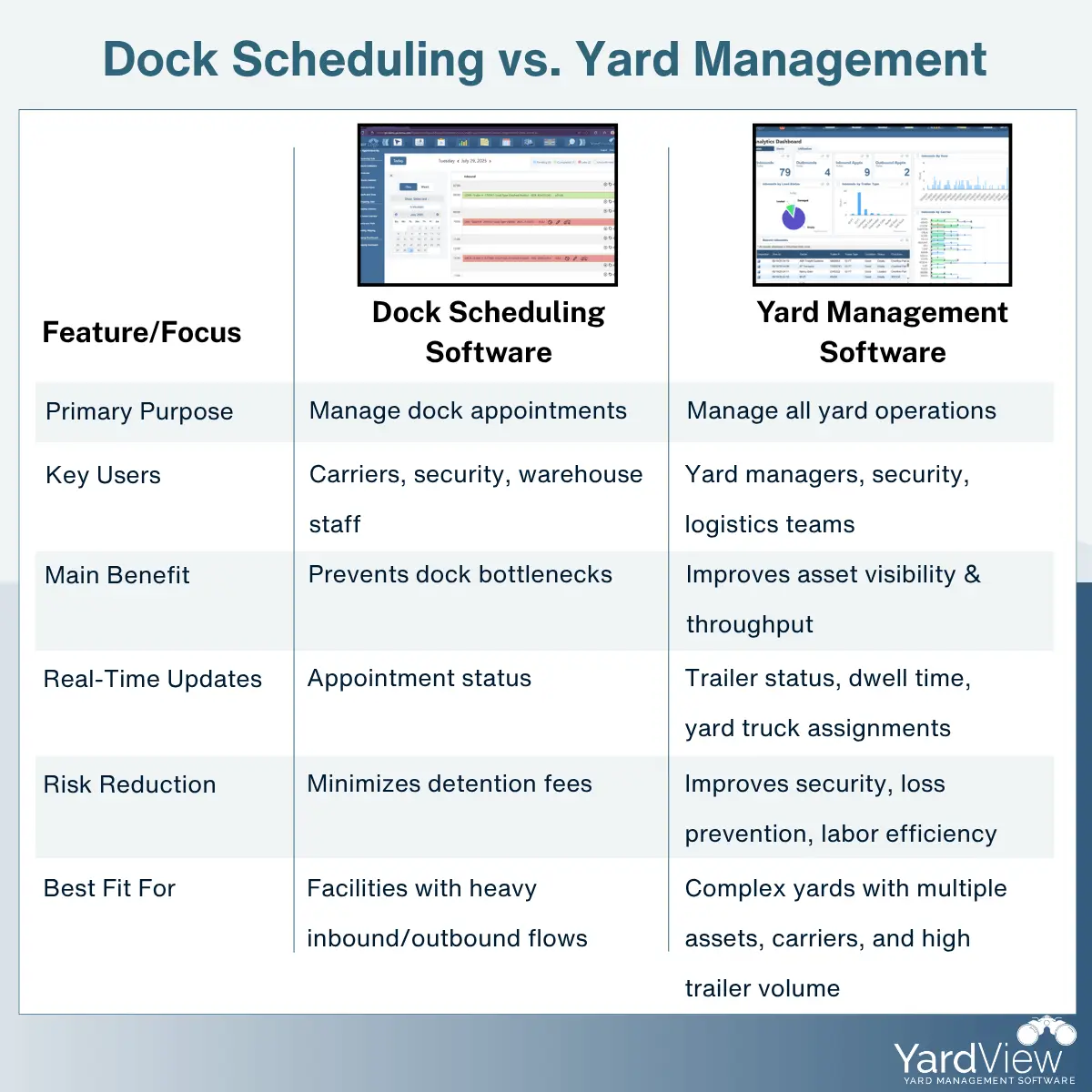What’s the Difference Between Yard Management Software vs. Dock Scheduling Software?
Orininally posted: January 31, 2022
Supply chain leaders often ask, “Do I need yard management software (YMS), dock scheduling software, or both?”
At first glance, the two sound similar. Both improve how freight moves, cut down on costly delays, and help operations run smoother. Understanding how they differ, and where they connect, is key to creating more efficient logistics operations.
What Is Dock Scheduling Software?
A dock scheduling software tool, (sometimes called dock appointment scheduling) (sometimes called dock appointment scheduling) helps manage appointments. It handles appointments for both inbound and outbound shipments.
It looks at factors like dock availability, labor, equipment, and carrier requests. Then, it automates booking to keep freight flowing.
The goal of it is to:
- Reduce waiting times
- Cut detention fees (fines paid when trucks wait too long)
- Provide better control over the loading doors
For a detailed guide, see Dock Scheduling Software: What to Look For, Why It Matters, and How to Choose the Right One.
What Is Yard Management Software?
Yard Management Software provides visibility and control across the entire yard area. This includes trailers, drivers, and other valuable assets in the yard. The software connects yard activities with other key systems and dock operations. With a YMS, managers get a clear view of all movements from when a truck checks in at the gate until it leaves the dock.
A YMS acts as the bridge between your TMS (Transportation Management System) and WMS (Warehouse Management System), and your dock operations. It gives managers yard-wide visibility. This enables quicker decisions that optimize trailer movement, worker assignments, and dock usage.
For a detailed overview of features and benefits, see What is a Yard Management System? Definition, Benefits, and How it Works.
Comparing Dock Scheduling Software and Yard Management Software
Both tools improve operations and make the yard easier to see and manage. However, they focus on different areas.
- Dock Scheduling Software manages dock appointments. It helps carriers and warehouse teams avoid door bottlenecks. It offers strong scheduling, to keep appointments on track.
- Yard Management Software (YMS) manages the whole yard. It shows trailer locations, dwell time, yard truck activity, and asset movement in real time. YMS helps teams use assets better, work more efficiently, and move freight through the yard faster.

Together, these systems form a connected dock management and yard operations system. It also eliminates separate communication efforts (silos) between scheduling and daily yard activities. This ensures smoother handoffs, better communication, and higher efficiency across the facility. In addition, this combination speeds up gate movements and increases overall data accuracy.
Do You Need One or Both?
The short answer: It depends on your operation.
- Dock Scheduling Alone → Best if your biggest challenge is appointment bottlenecks at the dock.
- Yard Management Alone → Best if you have reliable scheduling processes but need visibility across the entire yard.
- Integration of Both → With YardView, you can get both. YardView provides dock scheduling software and complete yard management software in one platform. This unified approach provides a seamless workflow from dock to yard. Or you can run standalone versions that suit your unique needs.
Think of dock scheduling as achieving precision at the door, while YMS provides yard-wide control. Together, integrated systems enable truly efficient yard operations. This allows your team to quickly respond to changing conditions.
Read our blog on A Model for Agile Yard Operations to learn more about quickly adjusting to changing conditions.
.webp)
How Yard Management Improves Dock Scheduling
A YMS makes dock scheduling stronger by:
- Automating Assignments: Matching yard trucks to open dock doors
- Tracking Time: Tracking dwell and turn times to spot delays
- Better Communication: Improving the flow of information between carriers, drivers, and dock staff.
- Reducing Costs: Cutting idle time, fuel use, and detention costs
This is why many companies now prefer one integrated system that combines dock scheduling and YMS. It creates a more flexible, reliable yard that keeps freight moving — even when things change fast.
Future of Dock Scheduling & Yard Management Software
The next generation of dock and yard systems will address challenges far beyond today’s labor shortages and rising costs:
- Severe Weather → Smarter schedules and alerts will help yards keep running during storm events.
- Autonomous Trucks → Technology will handle check-ins, dock assignments, and guide safety checks.
- AI & Predictive Analytics → YMS tools will spot delays early, anticipate delays, and suggest the best "next move."
- Sustainability → Better scheduling will cut idling, lower emissions, and support environmental goals.
YardView is continuously evolving to meet these demands. By building these tools now, your operation is ready for today and for the future.
Why Choose YardView?
For over 25 years, YardView has helped businesses simplify complex yard operations. Our YMS connects with freight and dock solutions to deliver:
- Complete asset visibility
- Seamless dock-to-yard coordination
- Actionable analytics to cut costs and boost efficiency
Ready to see it in action? Schedule a personalized demo today.
Explore More YardView Resources


